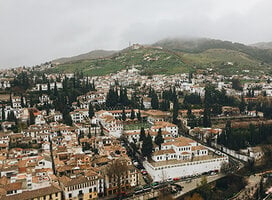Internships in Madrid, Spain
Located smack dab in the center of Spain, the Spanish capital is an exciting and lively city that is home to museums with spectacular art collections, a legendary nightlife, delightful parks, and of course the world famous futbol team (er, I mean soccer) Real Madrid. While Madrid may not be traditionally considered on par with the cosmopolitan level of London or Paris, it still remains a highly international destination with an estimated population of around one million immigrants. Despite the economic crisis that has plagued Spain in recent years, Madrid continues to be the top choice for job and internship seekers in the country. Many multinational corporations have opened offices in Madrid, transforming the city into an important hub of business, finance, and culture.
Photo credits: federicojorda.
At first glance, the capital of Spain may not seem like the ideal location for an internship. Spain has been experiencing a serious economic recession since 2008, leading many Spaniards to look for jobs abroad. Many people tend to overlook Madrid, opting for Barcelona instead, seduced by its proximity to the beach and the extravagant Gaudi architecture. However, Madrid does have its advantages—it is Spain’s business and commercial center, the seat of the national government, and home to noteworthy cultural institutions. The following is a list of some of the most popular internship fields in Madrid (but by no means exhaustive!):
Arts: As the setting of the “Golden Triangle of Art” (the Prado, the Reina Sofia, and the Thyssen), it should come as no surprise that Madrid has many opportunities available for those seeking an internship in a field related to the arts. This sector has no shortage of internship possibilities and to give you just a few ideas, here are some of the places you can intern for: art galleries, dance companies, graphic design companies, architect firms, and interior design companies to name just a few.
Business: Many multinational corporations have branch offices in Madrid, an indication that there are many internship opportunities in the business sector. While the job/internship search in this field is highly competitive due to the current economic crisis, there are a number of internship placement agencies that can help you with what you are looking for, whether it is a position in sales, marketing, public relations, or business development.
Tourism/Hospitality: Since the death of Francisco Franco in 1975 which ended a 39 year dictatorship, tourism has continued to be one of Spain’s fastest growing industries. If you thought tourism was only about being a tour guide, think again! Internships in the tourism industry include event planning, sales and marketing, event management, and customer service among others. If you love meeting and talking to new people, this may be a good sector for you to look into.
When and Where to Look for an Internship
There really is no “best time” to look for an internship in Madrid. Internships are available year-round, therefore you can start your search right away. It may be slightly easier looking for an internship that doesn’t fall during the summer months; in theory, you will not have as much competition from Spanish students (who try to secure internships for their summer break) if you apply for an internship during the fall, winter, or spring months. Summers in Madrid are also very dry and arid, so if you are not a fan of the heat, you may want to avoid the city during this time of year.
It is possible to search for an internship on your own through the traditional job search listings and expat forums online. However, if you have never been to Spain before and if you do not have an advanced level of Spanish, it may be a good idea to use an internship placement agency. Companies such as Adelante and EPA will guide you through the application process and place you in a company that matches your interests. These kinds of programs typically require you to take Spanish language classes and will usually take care of housing and airport pickup. They will also help you through the visa process which can be lengthy and time consuming.
Internships vary in duration—some may last only a month, others may last six months, and there are even some that may last a full year. The longer the internship lasts, the more experience you will get (and the better it looks on your résumé!). It is up to you to decide for how long you want to commit to an internship, but you should be prepared to be available for a minimum of at least two to three months.
Cost of Living in Madrid
One of the advantages of living in Madrid is that it is definitely cheaper than other European countries. That being said, the cost of rent (and pretty much everything else) has risen in recent years due to the economic crisis. Your internship will probably be unpaid, which means you will have to rely on personal savings to get by. The average cost of living in Madrid is around 1000 Euros (about 1300 USD). This estimate includes rent, utilities, transportation, groceries, and personal leisure. If you want to make some extra money on the side, it is very easy to work under the table giving private English classes.
Work Culture in Madrid
Etiquette: The locals of Madrid, known as Madrileños, are generally friendly and welcoming to foreigners. As a whole, Spain has a more relaxed work environment than in the United States, yet there is still some formality. When meeting new colleagues for the first time, you may find yourself giving two kisses on each cheek or you may simply shake their hands. Let your colleagues initiate the greeting and then follow suit. It is also typical to greet all your colleagues in the morning with a “Hola” or “Buenos días” and to make small talk, especially about the weather or the last soccer game.
Depending on the company, the dress code may be formal or casual—if it is formal, stick to skirts, pantsuits, and dresses with sturdy high-heeled shoes for the girls and suits and ties for the guys. In general, people tend to wear darker colors. Pay attention to what your coworkers wear and dress accordingly. When it comes to business meetings, do not be surprised if the meeting starts about fifteen minutes late and if the first few minutes are devoted solely to small talk.
The Spanish like to ease into things, interrupt each other frequently, and usually veer off topic from the meeting’s agenda. It is completely normal! And while Spain is famous for the mid-day siesta, not all companies observe this. Some companies do close around 2 PM and then reopen at 5 PM, while others will remain open. If your company does close for siesta, you will be allowed to go home and eat lunch.
Language: The official language in Spain is Spanish, of course. Some languages like Catalonia and Galicia have their own regional languages which are Catalan and Gallego respectively. Even though Madrid is the capital of Spain, it can be very hard to find people who speak decent English—often shopkeepers, waiters, or taxi cab drivers know very little English, if at all. While it isn't impossible to find an internship with a limited knowledge of Spanish, you will definitely get more out of your experience if you are fairly proficient in Spanish, and you can understand most of what your coworkers are saying to each other. So brush up on your language skills before you leave and enroll in some Spanish classes!
Networking: The Spanish deeply care about cultivating their business and personal
relationships. Business relationships may seem like they take a long time to build—the Spanish like to really get to know you before they hand over their loyalty. Once you have established a good working relationship, you will find that Spanish business relationships will remain loyal to you, even long after you have moved on.
Work and Labor Laws in Madrid
Most internships in Spain are unpaid, which means you will not receive the same benefits as a paid employee—no health benefits, no paid days off, etc. Finding a job with an actual salary can be difficult because you must have a work permit to legally work and live in Spain (unless you have an EU passport). Few companies will sponsor your visa, simply because the process is such a bureaucratic nightmare full of paperwork and confusion.
Contributed by Amélie Milet
Internship Programs in Madrid
Pagination
What People Are Saying
New Internship Placements
View the latest intern placement postings on our job board.
Related Internships Abroad Articles
Frequently Asked Questions
-
Is it expensive to live in Spain?
While larger cities like Madrid and Barcelona can be on the more expensive side, the cost of living in Spain is lower than in most European countries. A room in a shared apartment in a city center like Madrid can range from about €350-€600 ($390 - $672 USD).
-
Is it safe to live in Spain?
Spain is a very safe country. But, just like the rest of Europe, Spain is notorious for pickpockets. It's important to not carry your passport around and always keep an eye on your phone!
















